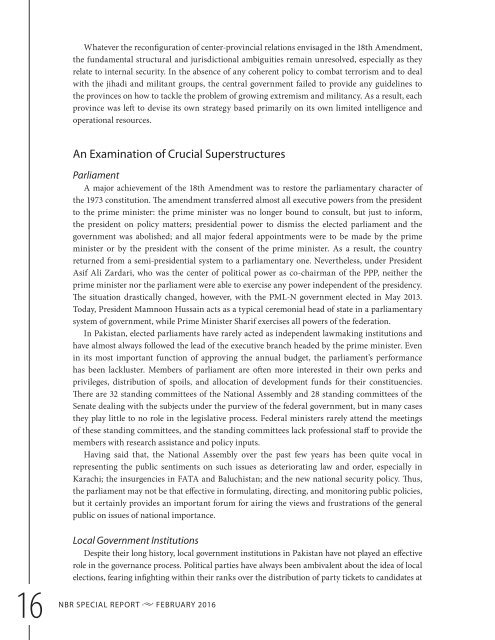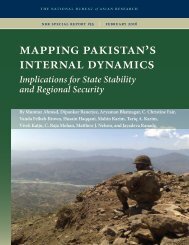pakistan’s
SR55_Mapping_Pakistan_February2016
SR55_Mapping_Pakistan_February2016
Create successful ePaper yourself
Turn your PDF publications into a flip-book with our unique Google optimized e-Paper software.
Whatever the reconfiguration of center-provincial relations envisaged in the 18th Amendment,<br />
the fundamental structural and jurisdictional ambiguities remain unresolved, especially as they<br />
relate to internal security. In the absence of any coherent policy to combat terrorism and to deal<br />
with the jihadi and militant groups, the central government failed to provide any guidelines to<br />
the provinces on how to tackle the problem of growing extremism and militancy. As a result, each<br />
province was let to devise its own strategy based primarily on its own limited intelligence and<br />
operational resources.<br />
An Examination of Crucial Superstructures<br />
Parliament<br />
A major achievement of the 18th Amendment was to restore the parliamentary character of<br />
the 1973 constitution. The amendment transferred almost all executive powers from the president<br />
to the prime minister: the prime minister was no longer bound to consult, but just to inform,<br />
the president on policy matters; presidential power to dismiss the elected parliament and the<br />
government was abolished; and all major federal appointments were to be made by the prime<br />
minister or by the president with the consent of the prime minister. As a result, the country<br />
returned from a semi-presidential system to a parliamentary one. Nevertheless, under President<br />
Asif Ali Zardari, who was the center of political power as co-chairman of the PPP, neither the<br />
prime minister nor the parliament were able to exercise any power independent of the presidency.<br />
The situation drastically changed, however, with the PML-N government elected in May 2013.<br />
Today, President Mamnoon Hussain acts as a typical ceremonial head of state in a parliamentary<br />
system of government, while Prime Minister Sharif exercises all powers of the federation.<br />
In Pakistan, elected parliaments have rarely acted as independent lawmaking institutions and<br />
have almost always followed the lead of the executive branch headed by the prime minister. Even<br />
in its most important function of approving the annual budget, the parliament’s performance<br />
has been lackluster. Members of parliament are oten more interested in their own perks and<br />
privileges, distribution of spoils, and allocation of development funds for their constituencies.<br />
There are 32 standing committees of the National Assembly and 28 standing committees of the<br />
Senate dealing with the subjects under the purview of the federal government, but in many cases<br />
they play little to no role in the legislative process. Federal ministers rarely attend the meetings<br />
of these standing committees, and the standing committees lack professional staff to provide the<br />
members with research assistance and policy inputs.<br />
Having said that, the National Assembly over the past few years has been quite vocal in<br />
representing the public sentiments on such issues as deteriorating law and order, especially in<br />
Karachi; the insurgencies in FATA and Baluchistan; and the new national security policy. Thus,<br />
the parliament may not be that effective in formulating, directing, and monitoring public policies,<br />
but it certainly provides an important forum for airing the views and frustrations of the general<br />
public on issues of national importance.<br />
16<br />
NBR<br />
Local Government Institutions<br />
Despite their long history, local government institutions in Pakistan have not played an effective<br />
role in the governance process. Political parties have always been ambivalent about the idea of local<br />
elections, fearing infighting within their ranks over the distribution of party tickets to candidates at<br />
SPECIAL REPORT u FEBRUARY 2016



